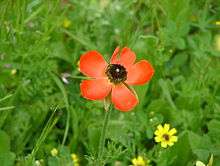Ranunculus asiaticus
| Ranunculus asiaticus | |
|---|---|
 | |
| Scientific classification | |
| Kingdom: | Plantae |
| (unranked): | Angiosperms |
| (unranked): | Eudicots |
| Order: | Ranunculales |
| Family: | Ranunculaceae |
| Genus: | Ranunculus |
| Species: | R. asiaticus |
| Binomial name | |
| Ranunculus asiaticus L. | |
Ranunculus asiaticus (Persian buttercup) is a species of buttercup (Ranunculus) native to the eastern Mediterranean region in southwestern Asia, southeastern Europe (Crete, Karpathos and Rhodes), and northeastern Africa.[1]
It is a herbaceous perennial plant growing to 45 cm tall, with simple or branched stems. The basal leaves are three-lobed, with leaves higher on the stems more deeply divided; like the stems, they are downy or hairy. The flowers are 3–5 cm diameter, variably red to pink, yellow, or white, with one to several flowers on each stem.[2]
It is a protected plant in some jurisdictions, including Israel.
Cultivation and uses
It is a popular ornamental plant in gardens, and widely used in floristry. Numerous cultivars have been selected, including 'Bloomingdale', 'Picotee', 'Pot Dwarf', and 'Superbissima'. The plants can tolerate light frost, but are not hardy at temperatures below -10 °C.[2]
Some strains such as 'Tecolote' and 'Bloomingdale' produce double flowers (not shown here).
References
- ↑ Germplasm Resources Information Network: Ranunculus asiaticus
- 1 2 Huxley, A., ed. (1992). New RHS Dictionary of Gardening. Macmillan ISBN 0-333-47494-5.
| Wikimedia Commons has media related to Ranunculus asiaticus. |
| Wikispecies has information related to: Ranunculus asiaticus |